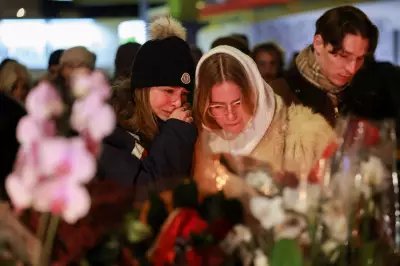
Coroner to Deliver Verdict on Australia's 'First Christian Terrorist Attack'
After nearly three years of investigation, Queensland's state coroner is poised to deliver crucial findings regarding the Wieambilla shootings that claimed three lives in what police described as Australia's inaugural fundamentalist Christian terrorist attack.
The tragedy unfolded on 8 December 2022 at a remote property near Wieambilla, approximately 270km north-west of Brisbane, where police officers Matthew Arnold and Rachel McCrow were executed in cold blood by a trio of conspiracy theorists.
The Deadly Ambush and Its Aftermath
The attackers - Stacey Train, her ex-husband Nathaniel Train, and her new husband Gareth Train - had established deliberate, camouflaged positions to ambush responding Queensland police officers. After killing Constables Arnold and McCrow, the group continued their violent spree by murdering unarmed neighbour Alan Dare, who had come to investigate the commotion.
A third police officer, Randall Kirk, suffered gunshot wounds during the incident, while a fourth officer, Keely Brough, endured a terrifying ordeal as the Trains hunted her while she hid from the attackers. The violent episode concluded with a late-night shootout that saw all three perpetrators gunned down by police.
Queensland police subsequently characterised the incident as Australia's first fundamentalist Christian terrorist attack, though the precise motivation behind the killings has remained contested until now.
Conflicting Explanations for the Tragedy
Forensic psychiatrist Andrew Aboud testified during the inquest that the three perpetrators had developed 'folie à trois' or 'shared paranoid delusions', a rare psychological condition where delusions are shared among multiple individuals.
According to expert testimony, Gareth Train - described as a lifelong 'keyboard warrior' and conspiracy theory adherent - emerged as the dominant influence within the group. During the COVID-19 pandemic, his existing paranoia escalated into full-blown delusional mental illness, incorporating beliefs that police officers were demons who needed to be confronted to facilitate the second coming of Jesus Christ.
Dr Aboud concluded that the Trains ultimately died by 'suicide by cop', with their actions stemming primarily from mental illness rather than any coherent ideological message.
However, this interpretation faced challenge from terrorism expert Josh Roose of Deakin University, who argued the Wieambilla shootings constituted a form of terrorism - violence intended to advance political objectives. Roose pointed to 'algorithmic radicalisation' through online platforms, where the Trains were exposed to increasingly extreme content that ultimately culminated in their deadly plan.
Digital Radicalisation and International Connections
The inquest heard compelling evidence about the Trains' digital radicalisation process, which occurred partly through YouTube comments sections. The group maintained contact with American conspiracy theorist Donald Day Junior, known online as 'Geronimo's Bones', until the night of their deaths.
Day has since pleaded guilty to firearms offences in Arizona, though the extent of his influence on the Trains' actions remains part of the coroner's considerations.
State Coroner Terry Ryan has examined nine primary questions regarding the tragedy, including the killers' profiles and motivations, whether authorities possessed prior knowledge that might have indicated their lethal intentions, and the conduct of Queensland's special emergency response team during the final confrontation.
The findings, scheduled for delivery from approximately 12.30am AEDT on Friday, are expected to address whether procedural or policy changes within police operations could prevent similar tragedies in future.
Queensland Police Deputy Commissioner Cheryl Scanlon indicated during proceedings that the police service aligns with Professor Roose's perspective, viewing the Wieambilla incident as a terrorist act rather than solely a consequence of mental illness.
As the community awaits closure, the coroner's verdict promises to provide long-sought answers about one of Australia's most disturbing modern violent episodes.





